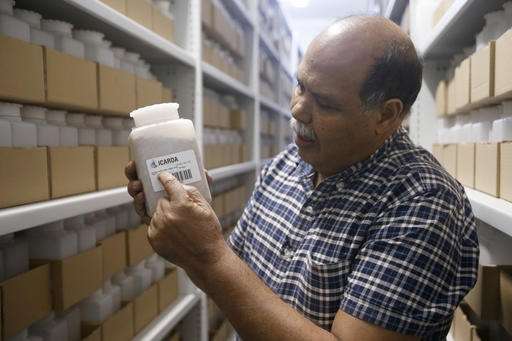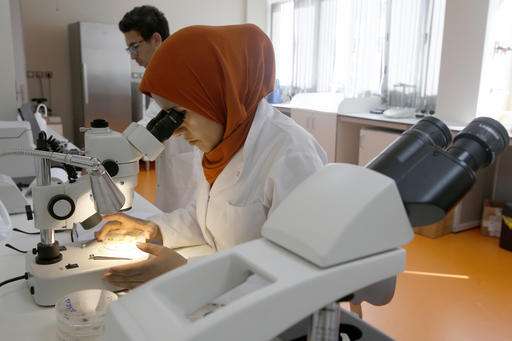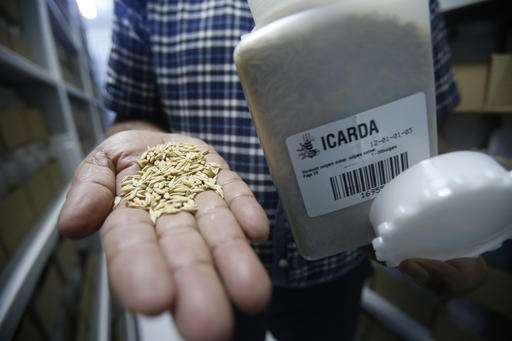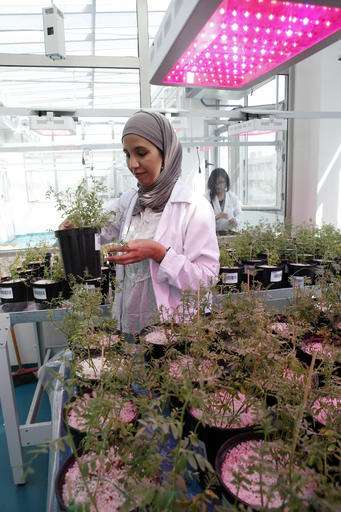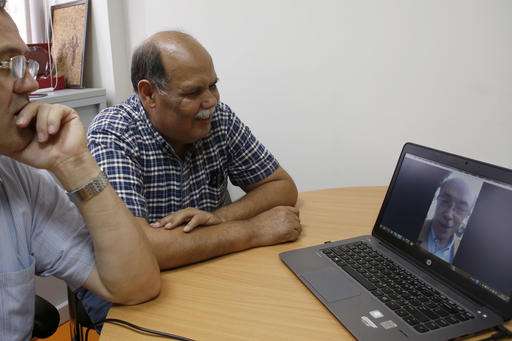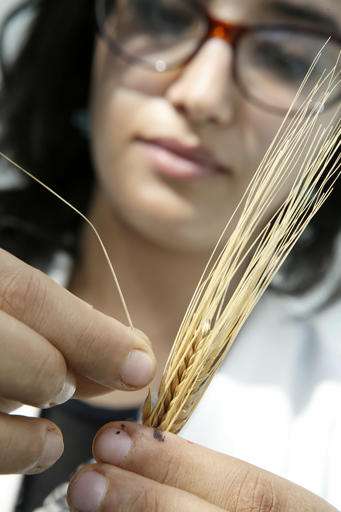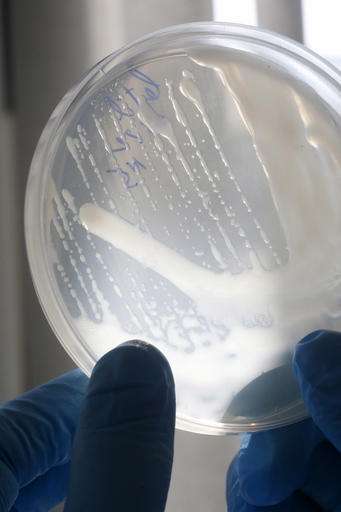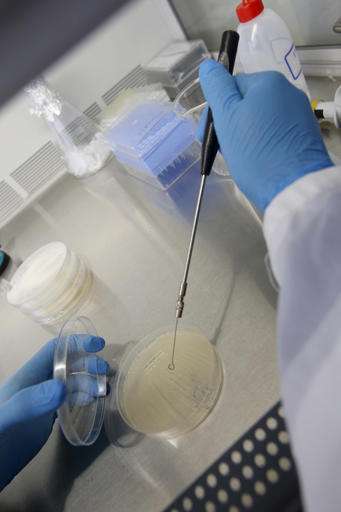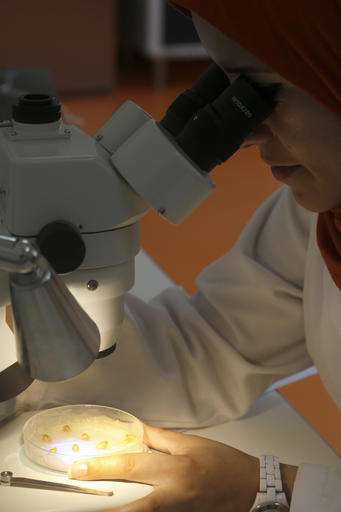Ahmed Amri, head of ICARDA's Genetic Resources Unit, displays seed samples in the Rabat seed bank, Morocco, Friday, Oct. 21, 2016. Spanning from wheat and barley varieties, to lentils and chick peas, the seed bank in Rabat has become ICARDA's primary site for both preserving these essential staples, as well as developing them to become more resistant to disease and harsh climates. (AP Photo/Abdeljalil Bounhar)
Should a doomsday agricultural crisis hit the world's driest environments, scientists and farmers will turn to an up-and-coming research center and seed bank in Morocco to restock their harvests.
Tucked away in the university hub of Irfane in Rabat, the International Center for Agricultural Research in the Dry Areas, or ICARDA, hosts the largest collection of seeds in North Africa.
"If for any reason, a particular community lost all their resources, we are capable of providing them with the seeds for restoration and rehabilitation," says Ahmed Amri, head of ICARDA's Genetic Resources Unit.
The crucial role of seed banks in protecting biodiversity is receiving increasing attention because of climate change, which threatens to wipe out crops as dry areas of the world get even hotter and drier. The impact on African agriculture is among the topics being discussed at U.N. climate talks taking place through next week in Morocco.
The site in Rabat has become ICARDA's primary center of storage and research after its previous hub in Aleppo, Syria, was seized by an Islamist rebel group in September 2015.
"We couldn't continue doing this work because of the situation in Syria, so we decided to make arrangements to move elsewhere to continue our work," says Amri, who used to work in Aleppo, but is now leading genetic research efforts in Rabat.
Inaam El Meziani, assistant researcher at ICARDA, inspects seeds to ensure they are free from diseases in the Rabat seed bank, Morocco, Friday, Oct. 21, 2016. Spanning from wheat and barley varieties, to lentils and chick peas, the seed bank in Rabat has become ICARDA's primary site for both preserving these essential staples, as well as developing them to become more resistant to disease and harsh climates. (AP Photo/Abdeljalil Bounhar)
While many of the research activities moved to Rabat, 98 percent of the Aleppo center's seeds were safely transferred to ICARDA's center in neighboring Lebanon. Duplicates were also sent to a "doomsday" seed vault in Svalbard in the Norwegian Arctic, which serves as a backup for other seed banks worldwide.
Rebels from the ultraconservative Ahrar al-Sham group have occupied the Aleppo center since September 2015, cutting off access to its 75 employees. Amri has daily contact with the five staff members who remain in Aleppo, including associate scientist Ali Shehadeh.
"With the cease-fire, it's stable and unstable at times," Shehadeh told The Associated Press from Aleppo in a Skype interview facilitated by Amri.
The Rabat center holds tens of thousands of seeds spanning from wheat and barley to lentils and chickpeas inside a vault in near-freezing temperatures. The seed bank not only preserves these essential staples but develops them to become more resistant to disease and a warming climate.
Ahmed Amri, head of ICARDA's Genetic Resources Unit, displays seed samples in the Rabat seed bank, Morocco, Friday, Oct. 21, 2016. Spanning from wheat and barley varieties, to lentils and chick peas, the seed bank in Rabat has become ICARDA's primary site for both preserving these essential staples, as well as developing them to become more resistant to disease and harsh climates. (AP Photo/Abdeljalil Bounhar)
Last year, Morocco faced an unprecedented drought that scientists and the government and have linked to climate change, with drier and warmer winters in Morocco and neighboring countries.
Domestic grain production dropped, forcing the government to drop tariffs on imports to avoid shortages and stem rising prices. Last month, the government decided to temporarily remove import duties for lentils to lower the price just in time for the winter season—a time when lentils are widely consumed in Morocco.
Scientists at the Rabat center work closely with farmers in Marchouch, a nearby rural town. The scientists provide seed samples to farmers who allocate about 2 percent of their own farm land to test the seeds and provide feedback to scientists.
"We are looking for science-based solutions for farmers' problems," says Shiv Kumar Agrawal, a lentil breeder with ICARDA. These problems include contending with droughts, invasive insects and increasing production.
Fatima Ezzahra Kibou carries a jar of lentils planted at the nursery of the seed bank at the Rabat seed bank, Morocco, Friday, Oct. 21, 2016. Spanning from wheat and barley varieties, to lentils and chick peas, the seed bank in Rabat has become ICARDA's primary site for both preserving these essential staples, as well as developing them to become more resistant to disease and harsh climates. (AP Photo/Abdeljalil Bounhar)
Farmers report back to scientists on the results of the harvest yielded from the seed samples, after which further tests are conducted to improve the seeds' durability and production yield.
Farmer Abdellah Slimani, 48, president of a farmers' cooperative in Marchouch, believes the feedback loop has helped him and fellow farmers to improve their own methods as climate change continues to impact harvests.
"We hope that this year's harvest will be better, God willing," Slimani says.
Bruce Campbell of the Consortium of International Agricultural Research Centers says the climate conference in Marrakech offers a unique opportunity to address the impact of climate change on African agriculture.
"Considering all African countries have included agriculture in their climate adaption strategies, (the conference) will be the ideal setting to discuss how the most promising solutions can be deployed and indeed, funded," he says.
-
Ahmed Amri, head of ICARDA's Genetic Resources Unit, chats on Skype with his colleague Ali Shehadeh, associate scientist based in Aleppo in the Rabat seed bank, Morocco, Friday, Oct. 21, 2016. Spanning from wheat and barley varieties, to lentils and chick peas, the seed bank in Rabat has become ICARDA's primary site for both preserving these essential staples, as well as developing them to become more resistant to disease and harsh climates. (AP Photo/Abdeljalil Bounhar)
-
Houda Haidar prepares barley seeds for planting in the nursery in the Rabat seed bank, Morocco, Friday, Oct. 21, 2016. Spanning from wheat and barley varieties, to lentils and chick peas, the seed bank in Rabat has become ICARDA's primary site for both preserving these essential staples, as well as developing them to become more resistant to disease and harsh climates. (AP Photo/Abdeljalil Bounhar)
-
Bacteria samples are examined in the ICARDA seed vault in the Rabat seed bank, Morocco, Friday, Oct. 21, 2016. Spanning from wheat and barley varieties, to lentils and chick peas, the seed bank in Rabat has become ICARDA's primary site for both preserving these essential staples, as well as developing them to become more resistant to disease and harsh climates. (AP Photo/Abdeljalil Bounhar)
-
Bacteria samples are examined in the ICARDA seed vault in the Rabat seed bank, Morocco, Friday, Oct. 21, 2016. Spanning from wheat and barley varieties, to lentils and chick peas, the seed bank in Rabat has become ICARDA's primary site for both preserving these essential staples, as well as developing them to become more resistant to disease and harsh climates. (AP Photo/Abdeljalil Bounhar)
-
Inaam El Meziani, assistant researcher at ICARDA, inspects seeds to ensure they are free from diseases in the Rabat seed bank, Morocco, Friday, Oct. 21, 2016. Spanning from wheat and barley varieties, to lentils and chick peas, the seed bank in Rabat has become ICARDA's primary site for both preserving these essential staples, as well as developing them to become more resistant to disease and harsh climates. (AP Photo/Abdeljalil Bounhar)
© 2016 The Associated Press. All rights reserved.
